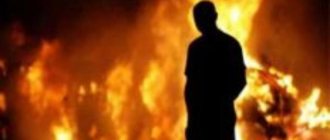Last updated March 2021
In our society you can often hear the phrase “murder by negligence.” However, it is only relevant for American TV series and films about investigations. There it may also sound like “manslaughter.” For legal science, this phrase contains two contradictory words “murder” and “negligence”. In Russian criminal law, this is called causing death by negligence.
The current Criminal Code defines murder as intentionally causing death; it is prohibited by Art. 105 of the Criminal Code of the Russian Federation. Death caused by another form of guilt - through negligence - is included in a separate article. 109 of the Criminal Code of the Russian Federation.
In detail: Article 105 of the Criminal Code of the Russian Federation “Murder”
A criminal offense called “Careless Murder” was found in Russian law in the Criminal Code of the RSFSR of 1960 (valid until January 1, 1997 before the current code came into force), which contained article number 106 punishing such an act. The punishment for committing it was supposed to be either up to 3 years of imprisonment, or up to 2 years of correctional labor.
Composition of a criminal act
The main and necessary elements of the crime for the onset of criminal liability are reflected in the title of Article 109 of the Criminal Code of the Russian Federation.
The object of a criminal act—that which is harmed by the actions of the perpetrator—is human life.
The subject - the person who can be punished for this crime - is a sane person who has reached the age of 16 at the time of the commission.
The subjective side - the attitude of the perpetrator to the crime - is guilt in the form of negligence (Article 26 of the Criminal Code of the Russian Federation). It is the subjective side that distinguishes the act in question from murder.
Negligence can be expressed:
- In criminal frivolity - a person realizes that he is breaking some rules, admits that these actions may lead to negative consequences, while not wanting them and arrogantly hoping that they will not occur. For example, the perpetrator relies on his skill, physical strength, and other skills and abilities that will ensure the victim’s survival.
- In criminal negligence, the perpetrator does not foresee the occurrence of negative consequences as a result of his illegal actions, although with sufficient care he could or should have foreseen them.
What distinguishes this form of guilt from an accident is that a person does not foresee the occurrence of bad consequences, but at the same time could not and should not foresee them (Article 28 of the Criminal Code of the Russian Federation).
The objective side is the actions or inactions themselves, as a result of which the death of the victim is caused - it can be expressed in any actions of the perpetrator, as a result of which the death of the victim follows, with the exception of those provided for by special rules, which will be discussed below.
Vera Viktorovna Dolganina
Practicing lawyer with more than 10 years of experience.
Ask a Question
Most often, causing death by negligence is associated with failure to comply or improper compliance with any rules, standards, norms and other safety requirements, basic precautions when handling dangerous devices, mechanisms, etc.
How to prove that death occurred as a result of negligence?
In order for the perpetrator not to face punishment in the form of imprisonment for murder, he needs to prove that the death of the victim was accidental, committed through negligence.
To do this, it is necessary to find witnesses who are ready to confirm that the damage was not inflicted with the aim of taking the life of another person.
If there is video evidence, for example, a recording from a phone or video from a CCTV camera, then it is imperative to present it in court.
Examples
According to Art. 109 of the Criminal Code of the Russian Federation may qualify actions/inactions that resulted in the death of another person. Under certain circumstances this may be, for example, the following cases:
- the owner released the dogs in the forest or city park early in the morning, assuming that no one was nearby, as a result of which the dog attacked the person, and he died from the injuries received;
- death during a hunt due to improper behavior or placement of participants;
- improper use of firearms;
- delivering blows that did not cause harm, as a result of which the victim fell and received an injury incompatible with life, such as a traumatic brain injury;
- actions/inaction of parents - for example, when parents put a child in bed with them, and, having fallen asleep, he is crushed, leaving him in a filled bath, a closed car in hot weather, other life-threatening circumstances, resulting in his death;
- similar actions or inaction of other people in relation to helpless persons, disabled people, etc.
- throwing a pitchfork, knife, or ax when they hit vital organs, for example, the head, etc.
Commentary on Article 109 of the Criminal Code of the Russian Federation
The legislation distinguishes the concept specified in the article from accidental causing of death. Under circumstances of an indirect nature of causing death, i.e. not directly from the actions of a specific person, there is no liability. For example, death may occur as a result of the breakdown of equipment used to provide services. Provided that it was in good working order and met all standards, the performer is declared innocent.
Changing the interpretation from “murder” to “unintentional causing of death” provides greater justice for persons who, in fact, did not have the intention of taking a life. In cases where the charges under the article are justified, the process of reclassifying the case under Art. 105. In most cases, with a planned plan, there is a high probability of “staying dry” or receiving a minimum punishment, provided that the intent is concealed.
Frivolity and negligence are mutually exclusive. In the first case, death is assumed as an outcome, but due to the incomparability of the capabilities of the accused and real conditions, taking into account psychosomatic factors that a person cannot control, such an outcome was excluded. In the second interpretation, the defendant could not predict the outcome of events based on experience due to circumstances beyond his control.
Frivolity is characterized by:
- The ability to foresee death from an action.
- The desire to prevent death.
- Arrogant calculation.
- The presence of a forecast of actions, built taking into account the experience of similar situations.
- The danger of an action is realized only with a fatal outcome, not earlier.
For example, a driver is driving along a highway at a speed of 90 km/h. On a dangerous section of the road, he decides not to slow down, because... Having noticed a threat, he will be able to slow down without consequences. And suddenly his brake system fails and he hits a road service worker.
Negligence is characterized by:
- Actual failure to foresee, although in theory the person could have foreseen the outcome.
- Inattention or lack of foresight that contributed to the lack of foresight.
- Reluctance and prevention, to the best of one’s ability, of a lethal outcome from the action.
- There is no forecast, because a person does not expect certain events from his actions.
- The criminality of the act is considered an accident.
For example, a driver is driving along a poorly lit unfamiliar street and does not notice a road sign requiring him to give way because of a nearby tree.
As a result, an accident occurs involving another driver, resulting in his death. In this case, the person was moderately attentive, but did not sufficiently foresee all the possible outcomes of his action. The age criteria under the article for the accused is 16 years or older at the time of the crime. In this case, any person, regardless of age (child, capable person, pensioner), is recognized as an injured person.
Punishment
So, the law establishes liability not only for the fact that a person purposefully caused harm, in this case, to the life of the victim, but also for when this harm occurs as a result of the frivolous or careless attitude of the perpetrator towards the actions or inactions committed. According to some, this happens accidentally.
Part 1 art. 109
Part one of Article 109 of the Criminal Code of the Russian Federation under consideration establishes the consequences for the perpetrator for “simple”, that is, without aggravating features, causing death with careless guilt.
It entails one of the following penalties for up to 2 years :
- Correctional work.
- Restriction of freedom.
- Forced labor.
- Deprivation of liberty.
Part 2 Art. 109
Part two provides for a qualifying attribute, that is, aggravating guilt and at the same time toughening punishment - careless infliction of death, which was the result of improper performance by the perpetrator of his professional duties.
As an example of this circumstance, incorrect actions can be given:
- medical worker during surgery, treatment;
- the driver of a forklift when carrying out loading and unloading operations in violation of the rules;
- a vehicle driver during his technical inspection who did not apply the parking brake, etc.
Thus, according to Part 2 of Art. 109 of the Criminal Code of the Russian Federation, the subject is characterized by both general and special characteristics. A person who has special professional knowledge and holds a position in which he is obliged to comply with officially established rules for carrying out this activity, for example, storing hazardous substances, carrying out any work (at height, loading and unloading, rigging, gas welding and others) is subject to liability under it. ).
The duration of any punishment for a crime committed in such conditions is 3 years , it can be in the form of:
- Restrictions on freedom.
- Forced labor.
- Imprisonment.
At the same time, additional punishment may be imposed with forced labor and imprisonment - the court has the right to prohibit the guilty person from holding certain positions or carrying out certain activities for up to 3 years.
Part 3 Art. 109
Part three of Article 109 of the Criminal Code of the Russian Federation specifies a special qualifying feature of this crime - the death of two or more persons.
The duration of punishment for such a crime can be up to 4 years , it can be:
- Restriction of freedom.
- Forced labor.
- Imprisonment in places of deprivation of liberty.
Under this part of the article, an additional punishment similar to that imposed under Part 2 and for the same period can only be applied with imprisonment.
How much do you get for negligent homicide?
According to the second part of Article 109 of the Criminal Code, in case of careless murder, an increase in the penalty is provided when the rash actions of a person resulted in the death of not one, but two or more people. This may relate to violation of professional duties, which was the cause of death.
If we are talking about the intentional infliction of grievous bodily harm, which resulted in death, then this can be considered a crime with intent, that is, in this case, the criminal act will be classified as murder.
Special formulations
Article 109 of the Criminal Code “Causing death by negligence” is the so-called general rule. That is, it punishes all careless actions or inactions that led to the death of the victim, with the exception of those specific actions/inactions that are prohibited by individual articles. Such norms are called special.
In other words, everything that is not prohibited by special rules, but through negligence resulted in the death of the victim, is punishable under Art. 109. If the Criminal Code contains an article prohibiting specific actions/inactions that resulted in the death of another person, this special article is applied. Most often, death in these norms is prescribed as an aggravating circumstance, and therefore a punishment.
There are quite a few such articles in the Criminal Code. In them, the death of the victim, which occurred as a result of the negligence of the perpetrator, can be specifically named as an aggravating circumstance . These are, for example, the following fairly common articles:
- Part 4 Art. 111 – intentional infliction of grievous bodily harm;
- clause "a" part 4 art. 131 – rape;
- clause "a" part 4 art. 132 – sexual acts committed against the will of the victim;
- Parts 2 and 3 art. 143 – violation of labor protection rules;
- Part 2 Art. 167 – destruction of property;
- Part 2 Art. 215.1 – termination, limitation of electricity supply, disconnection from other facilities important for life support;
- Parts 2 and 3 art. 219 – violation of fire safety rules;
- Art. 224 – careless storage of firearms;
- clause “c”, part 3 and part 4 of Art. 238 - turnover of goods and services that do not meet safety requirements - under this article, in particular, persons who sold counterfeit, surrogate alcohol are responsible;
- Part 4-6 tbsp. 264 – violation of traffic rules (traffic rules) and the use of vehicles – this article punishes, in particular, drivers who hit pedestrians;
- Part 2-3 tbsp. 293 – negligence and many other articles of the Criminal Code.
In addition, death, which was caused by negligence by the actions/inaction of the perpetrator, may not be specifically named, but classified as “other grave consequences . Among the most common articles:
- Part 3 Art. 285 – abuse of power;
- clause "c" part 3 art. 286 - abuse of power and other articles of the code.
Cases qualified as malfeasance under the above standards may occur, for example, on the part of law enforcement officers vested with authority over citizens, including the use of force and special means.
Features of the crime
The features of the crime include the following:
- Most often, a crime occurs due to negligence or frivolity on the part of the accused. These phenomena in themselves are not intentional.
- As a rule, litigation lasts a very long time. The main task of the court is to confirm or deny the presence of motivation in the murder. To do this, multiple pieces of evidence are collected, as well as details and features of what happened.
- According to statistics, the largest part of crimes under Article 109 occurs during domestic quarrels and conflicts.
- Let us note that Article 109 is often confused with Article 111. The latter is applied in situations where the accused committed unintentional actions, causing harm to the health of the victim, and these actions subsequently caused death.
The outcome of the case in such proceedings depends on how much evidence can be collected and presented. On the part of the defendant, it is very important to have witnesses and any possible evidence confirming the lack of motivation in the murder.
Jurisdiction
According to the current law, carrying out checks on reports of crimes under Art. 109 of the Criminal Code of the Russian Federation and the investigation of criminal cases under it is carried out by investigators of the territorial departments of the Investigative Committee of the Russian Federation at the place where this incident occurred.
They also carry out verification activities and investigations according to a significant number of special norms, where one of the conditions of liability or an aggravating feature is the death of the victim due to the negligence of the perpetrator. This is, for example, Art. 131, 132, 143, 238, 285, 286, 293.
A preliminary investigation according to special norms of the Criminal Code is also carried out by units of other law enforcement agencies according to the rules established by Art. 150-151 Code of Criminal Procedure of the Russian Federation. For example, cases under Art. 111, 167, 264 and others are being investigated by investigators from the Ministry of Internal Affairs. Cases under some articles are investigated by police investigators, for example, under Art. 224.
Did the article help you?
Not really




